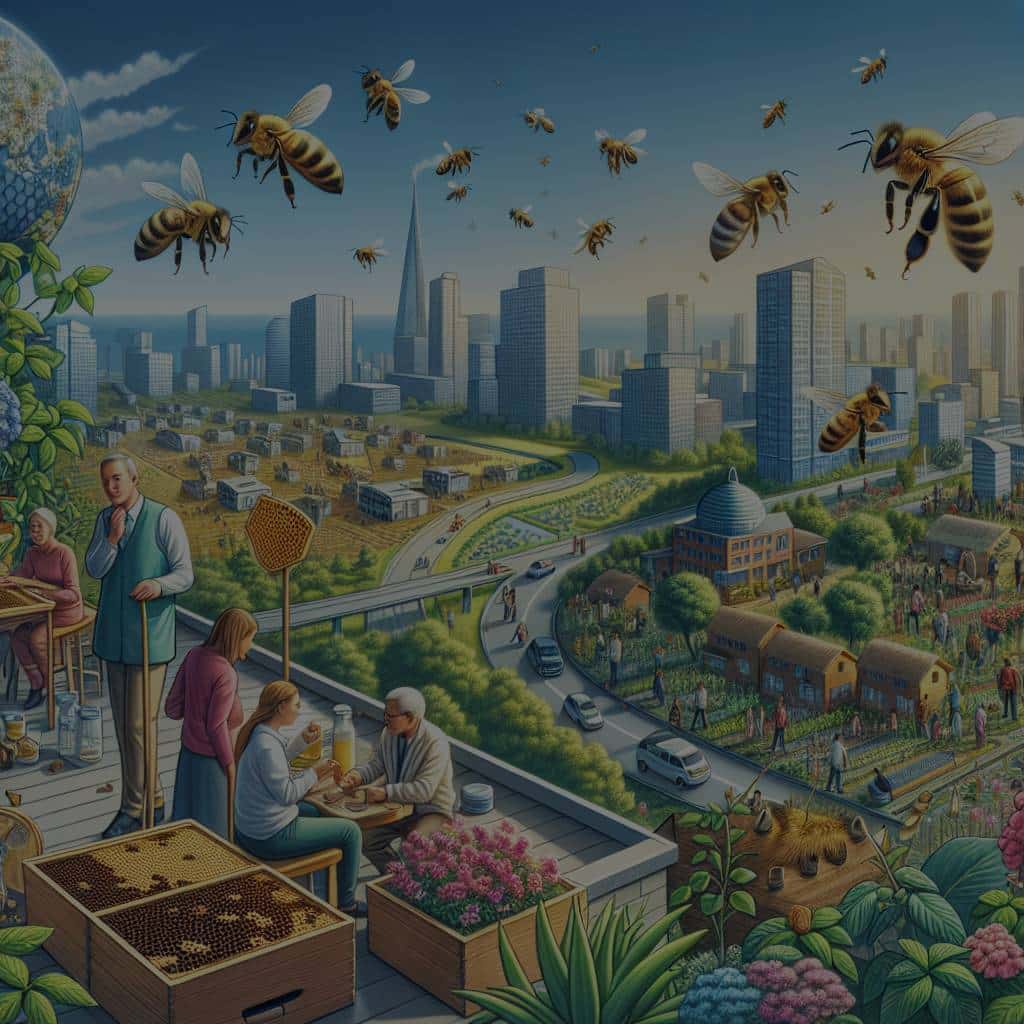Can the Practice of Urban Beekeeping Improve Environmental Awareness and Community Health?

The buzzing world of bees is more complex than most of us realise, and their significance stretches far beyond the sweet allure of honey. Today, let’s delve into the realm of urban beekeeping, a practice that is making waves in metropolitan landscapes around the world. With the increasing awareness about the indispensable role of bees in pollination, urban beekeeping has emerged as an innovative solution to support these tiny pollinators. But, the question is: can this practice bridge the gap between the city and nature, and in doing so, improve environmental consciousness and community health?
The Buzz about Urban Beekeeping
Urban beekeeping is not just a modern phenomenon or a trendy hobby; it is the practice of cultivating bees in an urban environment. This is carried out in various cityscapes – from rooftops to balconies to backyards – and involves setting up and maintaining beehives. Urban beekeepers manage their hives, ensuring their bees’ health and overall development.
A découvrir également : How Does Night Shift Work Affect Hormonal Balance and What Are Effective Coping Strategies?
Historically, beekeeping was a rural practice. However, the shift towards urban beekeeping has been catalysed by numerous factors: the need for sustainability, the desire to reconnect with nature, and the drive to contribute to local ecosystems.
Urban beekeeping has been gaining popularity in numerous cities, with countless amateurs and scholars alike delving into the world of bees. This surge in interest has been propelled by the realisation that bees play a crucial role in pollination. Without bees, our food system as we know it would crumble.
Sujet a lire : What Are the Effects of Whole-Body Vibration Training on Bone Density in Postmenopausal Women?
Honey, We Have a Problem: The Importance of Bees in Urban Pollination
Bees are known as key pollinators – they play a critical role in our ecosystem by aiding in the pollination of a vast majority of plants that make up the world’s food supply. In fact, bees are responsible for one out of every three bites of food we consume daily.
With the rapid development of cities, urban spaces are becoming increasingly barren and inhospitable for native pollinators. This situation has resulted in a sharp decrease in the number of bees, leading to a phenomenon known as Colony Collapse Disorder.
Urban beekeeping offers a potential solution to this problem. By introducing beehives in the city landscape, we provide bees with a new habitat and a chance for survival. In turn, these urban bees contribute to the pollination of city green spaces, gardens and windowsill flower pots. With each visit to a flower, a bee inadvertently picks up pollen and transfers it to the subsequent flowers it visits, effectively aiding in the pollination process, essential for plant reproduction.
Google and Beekeeping: A Model for Corporate Responsibility
Organisations are starting to understand the importance of supporting these vital pollinators. Take the tech giant Google, for instance. Google’s campus in Mountain View, California, is home to over 600,000 bees across four hives. The company has comprehended the value of these pollinators and has sought to contribute actively to their conservation.
Google’s foray into beekeeping is also an attempt to gather extensive data on bees. With the use of advanced technology, they can monitor the health and behaviour of their colonies. This data is shared with scholars and researchers worldwide, contributing to the global understanding and preservation of bees.
The company’s urban beekeeping initiative is an exemplar of corporate environmental responsibility. Other corporations can emulate this, integrating beekeeping into their corporate social responsibility strategies.
The Honey of Health: The Health Benefits of Urban Beekeeping
The production of honey is not the only benefit of urban beekeeping. The practice can have substantial health benefits for the community. Bee products like honey, propolis, and royal jelly are packed with nutritional and medicinal properties that can boost immunity, aid in wound healing, and offer anti-inflammatory and antibacterial benefits.
In addition to the health benefits derived from bee products, the practice of beekeeping itself can be therapeutic. It requires patience, observance, and a gentle touch. Many beekeepers find the activity calming and stress-relieving, contributing to improved mental health.
Urban Beekeeping: A Tool for Environmental Education and Community Development
Urban beekeeping has a profound potential as a tool for environmental education. It offers city dwellers a hands-on experience and intimate knowledge about bees and their vital role in our ecosystem, fostering a sense of responsibility towards these creatures and the environment.
Moreover, urban beekeeping can foster community development. It encourages community interaction, builds shared responsibility, and provides an opportunity for residents to contribute to their local ecosystem. With the increasing interest in urban beekeeping, city dwellers are banding together to learn, share experiences and promote this practice, fostering a sense of community in the heart of the city.
While we don’t offer a conclusion to this exploration, we hope that you are inspired by the potential of urban beekeeping as a bridge between urban environments and nature. Honey, it’s time to save the bees!
Urban Beekeeping and Sustainable Development: Bridging the Ecosystem Gap
The practice of urban beekeeping is more than just a hobby or a means to produce honey. It is an important step towards sustainable development, and it’s making a significant impact in addressing the global decline of honey bees – a grave issue that scientists and researchers have been grappling with for years.
A study published on Google Scholar and Scholar Crossref highlighted the decline of Apis Mellifera and other native bees. It cited urbanisation as one of the leading causes, as it tends to disrupt natural habitats, thereby affecting the health and survival of bee colonies. However, the same urban landscapes can play a pivotal role in reversing this trend.
Urban beekeepers, by setting up hives in backyards, rooftops, and balconies, create new habitats for these crucial pollinators. In addition to providing a safe haven for bees, these practices also enhance pollination services in the cityscape. Increased pollination can lead to greener urban spaces, contributing to biodiversity and enhancing the overall health of the urban ecosystem.
Moreover, urban beekeeping aligns with the concept of sustainable development. According to Wilson Rich, a prominent figure in the urban beekeeping scene, this practice promotes the use of city spaces in a way that meets human needs while preserving the environment for future generations. Hence, urban beekeeping could potentially play a crucial role in attaining the United Nations Sustainable Development Goals.
The Blossoming Trend of Urban Beekeeping Associations and Their Roles
The growth and popularity of urban beekeeping have given rise to several beekeepers associations, like the Best Bees in Boston, USA. These associations promote bee health, offer guidance to novice urban beekeepers, and advocate for policies that support the well-being of bees.
The associations also organise educational programs to enlighten the community about the importance of bees in providing ecosystem services. They explain how bees – from wild bees to the honey bee – contribute to pollination, which is essential for food production and biodiversity.
The beekeepers associations often collaborate with researchers, sharing data to help understand patterns in bee health, behaviour, and population. This collaborative approach, involving scholars and urban beekeepers, allows for comprehensive research that supports the development of effective strategies to safeguard bees.
Furthermore, these associations often pioneer community development initiatives. They encourage people to take up urban beekeeping, training them on best practices and providing ongoing support. This not only helps in bee conservation but also fosters a sense of community among city dwellers, contributing to social cohesion and sustainable urban living.
Conclusion: The Sweet Promise of Urban Beekeeping
To say that bees are vital to our existence is no exaggeration. These tiny creatures, with their contribution to pollination, uphold the balance of our ecosystems. Urban beekeeping emerges as a beacon of hope in the face of the ongoing global bee decline. By creating suitable habitats for bees within city landscapes, we not only improve their survival chances but also enhance urban green spaces.
The practice of urban beekeeping offers an accessible, hands-on way for city dwellers to connect with nature. It serves as a tool for environmental education, fostering awareness about the importance of bees and their role in our food system. Moreover, it encourages community interaction and shared responsibility towards local ecosystems.
Corporations like Google are showing the way forward, integrating beekeeping into their corporate social responsibility strategies. They understand that supporting these vital pollinators is not just an act of charity, but a necessity for sustainable futures.
In the words of the green version of the old saying, "we do not inherit the earth from our ancestors; we borrow it from our children." For the sake of our children and the generations to come, let’s embrace urban beekeeping and strive to make our cities more bee-friendly. As we move towards this goal, we will realise that the buzz about urban beekeeping is indeed worth all the honey in the world.
